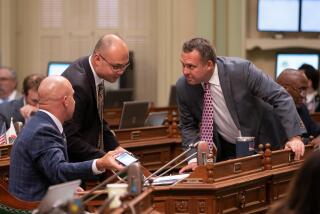Compton probes sale of land to group tied to embattled SEIU local
The Compton city attorney’s office is investigating a $1-per-lot sale of government land to a housing corporation that failed to receive the tax-exempt status it sought and is associated with a Los Angeles labor union mired in a spending scandal.
The housing group was established as a nonprofit in 2004, but never received an Internal Revenue Service exemption and had lost its right to do business in California for not filing its tax returns, The Times disclosed last month.
It was founded under the direction of Tyrone Freeman, president of the Service Employees International Union local, whose financial practices are the subject of a federal criminal investigation and a congressional inquiry.
Friday’s announcement of the Compton probe is the latest fallout from Times reports on the local, a related worker-training charity and the housing corporation.
Compton sold the Long Term Care Housing Corp. two parcels for $1 each in the belief that it was a tax-exempt nonprofit, said City Atty. Craig Cornwell. “We’re trying to get to the bottom of this,” he said.
Freeman has taken a leave of absence from the local, the United Long-Term Care Workers, and could not be reached for comment Friday. He has previously said he did nothing wrong.
A trustee now running the local, John Ronches, said in a statement that the disclosures about the housing corporation were “deeply troubling” and that the union would cooperate with Cornwell.
Ronches said the union is conducting its own examination, with the help of former California Atty. Gen. John Van de Kamp.
Attempts to interview officials for the corporation were unsuccessful Friday. In response to Times inquiries, a law firm for the group said last month that it had filed all its tax returns, regained the right to do business and was again seeking the IRS exemption.
According to its website, the corporation’s primary goal is to develop housing for union members, and it has opened two homes in Compton and planned to develop 28 condos there. Most members of the local are low-wage caregivers.
Cornwell said the two homes were built on the parcels the corporation purchased from the city, which had bought them earlier from the federal government. He said the inquiry includes the condo project, although it did not involve a similar land transaction.
He also said he would ask the City Council next week to authorize his office to continue the investigation, which is in its preliminary stage.
In a news release Friday, Compton Mayor Eric J. Perrodin said he would push for a thorough investigation, and Councilman Isadore Hall said he was “outraged” over the Times revelations.
On its website, the corporation had said that it had “a strong relationship” with the prominent California Community Foundation. It removed that statement from the site after a spokeswoman for the foundation told The Times that there had never been any relationship with the corporation.
In addition, the address for the corporation is a Bell Gardens home owned by Freeman’s former chief of staff, Rickman Jackson, who is now president of the SEIU’s biggest Michigan local. It is not known if Jackson has received payment for any use of his residence. He has taken a leave because of the investigation into the local’s finances and has declined to comment.
Freeman’s local and the worker-training charity have paid hundreds of thousands of dollars to home-based firms owned by his wife and mother-in-law, as well as $16,000 to a now-defunct minor league basketball team coached by his brother-in-law, records and interviews show.
The local also paid $219,000 to a small video company run by a former staffer who several other ex-employees say is a close friend of Freeman and his wife, Pilar Planells.
The local spent at least $300,000 last year on a Four Seasons Resorts golf tournament, a Beverly Hills cigar club, restaurants such as Morton’s steakhouse and a consulting contract with the William Morris Agency, the Hollywood talent shop.
And the union has paid $82,000 to a Florida video firm, an outlay described as a contribution to a nonprofit, according to the local’s financial filings with the U.S. Labor Department. The firm is not a nonprofit, and its chief executive told The Times the company never received the money.
More to Read
Sign up for Essential California
The most important California stories and recommendations in your inbox every morning.
You may occasionally receive promotional content from the Los Angeles Times.











